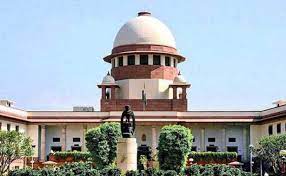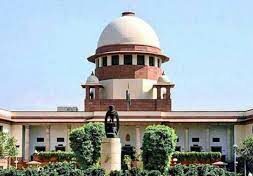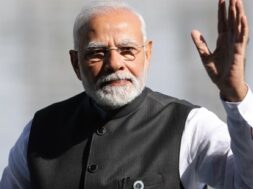
The Current Mechanism Ensures the Election Commissioners do only Government Bidding:” SC
Manas Dasgupta
NEW DELHI, Nov 23: Even as the Centre strongly opposed the pleas that seek a collegium-like system for creating a national pool for the selection of election commissioners, the Supreme Court on Wednesday expressed its reservations over the present system of the government appointing an election commissioner only from the civil servants and based on their seniority.
The court also took exception to the Centre’s submission that the appointments are “always based on seniority” and that the tenure is “mostly 5 years.” When the court asked why the pool of candidates is “confined to just civil servants”, the government replied, “That’s the convention. How do we not follow it? Can we bring in a national pool of candidates? It’s impossible.”
The government also objected to the court interference on the issue. The government told the court, “The court cannot interfere in the system only because we cannot show every single file how the appointment was done. You need to show instances wherein some wrong has happened. Merely on likelihood, apprehension or anxiety, interference from the court is not called for.” Also citing the sheer scale of the system, the government contended, “The whole mechanism doesn’t permit that somebody could go rogue.”
Referring to the “truncated” tenures the CECs and the ECs were being provided, the court observed, “The government is giving such a truncated tenure to the ECs and CECs that they are doing its bidding,” the court has said. Lambasting both the previous UPA and the current NDA governments at the centre, the court had pointed out that none of the governments since 2004 appointed the election commissioners enough time to complete the six year tenure the election commission act of 1991 provided.
The court, which on Tuesday had wanted the government to set up a mechanism to get a TN Seshan-type chief election commissioner, who was known for his aggressive electoral reforms and imposing the authority of the election commission from 1990 to 1996, on Wednesday asked the government to submit the file for the appointment of Mr Arun Goel as an election commissioner.
Besides some sharp comments and questions on the appointment process for the Election Commission of India, the Supreme Court has now asked for specific files: On the November 19 appointment of Arun Goel to the commission, rejecting the government’s objections for specific files.
The government lawyer added, “The court cannot interfere in the system only because we cannot show every single file how the appointment was done. You need to show instances wherein some wrong has happened. Merely on likelihood, apprehension or anxiety, interference from the court is not called for.”
AG Venkataramani told the five-judge Constitution bench headed by Justice KM Joseph and also comprising justices Ajay Rastogi, Aniruddha Bose, Hrishikesh Roy and C.T. Ravikumar, that it was dealing with the larger issue of appointment of ECs and the chief election commissioner (CEC) and it cannot look at an individual case flagged by advocate Prashant Bhushan. “I take serious objection to this and have my reservation to the court seeing the file amidst the hearing of a Constitution bench,” he said.
The bench said it started hearing a batch of pleas seeking a collegium-like system for the appointment of ECs and the CEC last Thursday and Mr. Goel was appointed as an EC subsequently on November 19. Therefore, it wants to see what prompted the step.
The bench said it wanted to know if there was any “hanky panky” in the appointment as he was only recently given voluntary retirement and immediately appointed to the poll body. Arun Goel’s appointment was mentioned by activist-lawyer Prashant Bhushan during the hearing of a batch of petitions on the very process. Mr Bhushan underlined that Mr Goel, a recently-retired IAS officer, was made part of the three-member Election Commission — besides chief Rajiv Kumar and Anup Chandra Pandey — just after the larger issue came up for hearing last week.
“Arun Goel was, till Thursday, working as a secretary-level officer in the government. Suddenly, he was given VRS on Friday and appointed as an election commissioner,” Mr Bhushan said. He was otherwise to retire on December 31 at the age of 60.
The court rejected the objections by the government lawyer, Attorney General R Venkataramani, who said it wasn’t right to take up individual instances. “We want to see what is the mechanism. We will not treat it as an adversarial and keep it for our record, but we want to know as you claim that everything is hunky dory… You have time till tomorrow,” the court told the government lawyer.
Arun Goel took charge only this Monday, November 21, according to the commission’s website. An IAS officer of the 1985 batch from the Punjab cadre, he retired as Secretary, Union Ministry of Heavy Industry, after more than 37 years of service. He is now in line to be Chief Election Commissioner after Rajiv Kumar demits office in February 2025.
The specific “hanky panky” check comes at a time when the court has been rather scathing in its observations on the wider process. Pointedly about its independence, the court presented a “hypothesis” for the central government: “Do you think the Election Commissioner… if he’s asked to take on none less than the Prime Minister — it’s just an example — and he doesn’t come around to doing it: Will it not be a case of complete breakdown of the system?”
It also cited how “one of the Election Commissioners, in fact, resigned”. The court did not take names, rather arguing its central point that the appointment system requires “a larger body” than just the union cabinet to decide on names. “There is a dire need for change.”
The court has already flagged how Article 324 of the Constitution — on appointment of election commissioners — does not chalk out a procedure. It envisages a law by Parliament to define the process, but that’s not been made in the last 72 years.
The government has cited a 1991 law and past conventions of appointment recommended by the PM-led cabinet to the President, who then picks an officer. “Stray instances cannot be the grounds for the court to interfere. To safeguard the position is our endeavour,” the government’s lawyer submitted earlier today.
“First a list is prepared of all senior bureaucrats. And then the list is sent to the Law Ministry which is then forwarded to the PM,” the lawyer explained, and said, “The existing system is working fine and there is no trigger point for the court to intervene.” The court stressed that it wasn’t saying the system is not correct. “There should be a transparent mechanism,” it added.
On the independence of India’s top poll body, the bench raised a pointed “hypothesis” for the central government: “Do you think the Election Commissioner… if he’s asked to take on none less than the Prime Minister — it’s just an example — and he doesn’t come around to doing it: Will it not be a case of complete breakdown of the system?”
It said the Election Commission is “supposed to be completely insulated”, and referred to how the government had spoken of appointing a “man of character”. “Character consists of various components… one particular characteristic required is independence,” it noted.
It then cited how “one of the Election Commissioners, in fact, resigned”. The court did not take names, rather arguing its central point that the appointment system requires “a larger body” than just the union cabinet to decide on names. “There is a dire need for change.”













